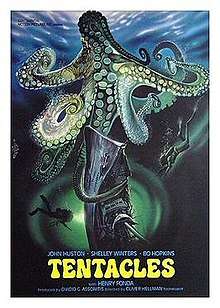Tentacles (film)
Tentacles (Italian title: Tentacoli) is a 1977 Italian-American horror film directed by Ovidio G. Assonitis and starring John Huston, Shelley Winters, Bo Hopkins and Henry Fonda. Although the film was intended to cash in on the success of Jaws,[2] Tentacles also bears numerous resemblances to the 1955 science fiction horror film It Came from Beneath the Sea.[3]
| Tentacles | |
|---|---|
 Theatrical release poster | |
| Directed by | Ovidio G. Assonitis[1] |
| Produced by | E. F. Doria[1] |
| Written by |
|
| Starring | |
| Music by | Stelvio Cipriani |
| Cinematography | Roberto D'Ettorre Piazzoli[1] |
| Edited by | A. J. Curi[1] |
Production company | Cherkawy Limited[1] |
| Distributed by | American International Pictures (USA)[1]
20th Century Fox (UK) Warner-Columbia Filmverleih (Germany) Columbia Pictures (Europe) Warner Bros (Norway) |
Release date |
|
Running time | 102 minutes[1] |
| Country |
|
| Language | English |
| Budget | $750,000 |
| Box office | $3 million |
Plot
Solana Beach, a seaside tourist resort, has come under attack by a giant octopus, which captures and devours human swimmers and boaters, picking the skeletons clean of flesh and bone marrow. Marine expert Will Gleason (Hopkins) and crusading newspaper reporter Ned Turner (Huston) suspect the construction of an underwater tunnel by the Trojan company, owned by Mr. Whitehead (Fonda). Trojan has been using radio signals that have been "above regulated levels", somehow maddening the octopus and causing it to attack human beings. In the end, the octopus is killed by Gleason's pair of killer whales.
Cast
- John Huston as Ned Turner
- Shelley Winters as Tillie Turner
- Bo Hopkins as Will Gleason
- Henry Fonda as Mr. Whitehead, President of Trojan Construction
- Delia Boccardo as Vicky Gleason
- Cesare Danova as John Corey
- Claude Akins as Sheriff Robards
- Alan Boyd as Mike
- Sherry Buchanan as Judy
- Franco Diogene as Chuck
- Marc Fiorini as Don
Production
The film was produced to capitalize on the success of Steven Spielberg's Jaws,[4] and as such was produced on a much smaller budget of $750,000. It was shot on location in Oceanside, Pismo Beach, and San Diego, California. The aquarium sequences were shot at Marineland of the Pacific in Los Angeles County.
The film's score was done by Italian composer Stelvio Cipriani, who scored the similarly Jaws-inspired films The Great Alligator and Piranha II: The Spawning around the same time.
Release
It was released theatrically by American International Pictures in Italy on February 25, 1977,[5] The film opened in New York on 3 August 1977 and in Los Angeles on 31 August 1977.[1][6]
The film was released on DVD by MGM in 2005 as part of their Midnite Movies series. The disc was a double feature release, pairing the film with Empire of the Ants.[7][8]
The film grossed $3,000,000.[9]
Reception
On Rotten Tomatoes, the film holds an approval rating of 0% based on seven reviews, with a weighted average rating of 2.6 out of 10.[10]
Contemporary reviews were also negative. Lawrence Van Gelder of The New York Times called it "an all-too-familiar giant octopus movie" that suffered from "atrocious acting in minor roles," "occasionally poor dubbing" and "a totally unoriginal story".[11] Variety noted that although "John Huston, Shelley Winters and Henry Fonda may bolster prospects", they "are all squandered in this one, thanks to a leaden script plus wooden direction by Oliver Hellman (who's also producer Ovidio Assonitiz)".[12][13] Linda Gross of the Los Angeles Times dismissed it as "a tedious movie, nightmarishly slow and intermittently out of synch".[14] Tom Milne of The Monthly Film Bulletin declared: "A devastatingly silly rehash of the Jaws formula, atrociously scripted, stiltedly acted, and reaching its low point in a grotesquely maudlin finale where the hero pours his heart out in a pep talk to the whales he has trained to graduate standards of communication".[15] Marjorie Bilbow of Screen International wrote, "The special effects are good and there is a fair amount of suspense before each victim is tentacled. But involvement with the characters is minimal ... the excitement lies only in anticipating when the next plastic victim will get nabbed".[16]
See also
- List of killer octopus films
References
Footnotes
- "Tentacles". American Film Institute. Archived from the original on 28 March 2014. Retrieved 5 August 2019.
- Kim Newman. Nightmare Movies: Horror on Screen Since the 1960s. Bloomsbury Publishing, 2011, p. 93. ISBN 9780786435562.
- William Schoell. Creature Features: Nature Turned Nasty in the Movies. McFarland, 2008, p. 139. ISBN 9780786435562.
- Tentacles at the MGM Archive
- "Cinema a Roma - Tentacoli (prima)" (in Italian). unita.it. Retrieved 3 July 2016.
- "Movies Around Town - Tentacles". New York Magazine. Retrieved 3 July 2016.
- "Empire Of The Ants / Tentacles (DVD)". dvddrive-in.com. Retrieved 3 July 2016.
- "Tentacles (1977) suckered me thirty years ago". blackholereviews.blogspot.it. Retrieved 3 July 2016.
- Richard Nowell. 'Blood Money: A History of the First Teen Slasher Film Cycle. Continuum, 2011, p. 257. ISBN 9781441143167.
- "Tentacles (1977) - Rotten Tomatoes". Rotten Tomatoes.com. Rotten Tomatoes. Retrieved 31 October 2018.
- Van Gelder, Lawrence (4 August 1977). "Film: Squid Pro Quo". The New York Times: 55.
- Willis 1985, p. 317: "Review is of 102 minute version viewed in London on June 15, 1977"
- Willis 1985, p. 318: "Review is of 102 minute version viewed in London on June 15, 1977"
- Gross, Linda (September 2, 1977). "Octopus Rocks the Boat in 'Tentacles'". Los Angeles Times. Part IV, p. 15.
- Milne, Tom (June 1977). "Tentacoli (Tentacles)". The Monthly Film Bulletin. 44 (521): 129.
- Bilbow, Marjorie (21 May 1977). "The New Films". Screen International: 16–17.
Sources
- Willis, Donald, ed. (1985). Variety's Complete Science Fiction Reviews. Garland Publishing Inc. ISBN 978-0-8240-6263-7.CS1 maint: ref=harv (link)